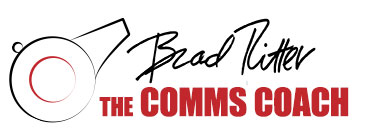 A spokesperson’s job is to TELL a story not BECOME the story. Standing in front of a media gaggle is rarely easy, even for the most experienced pros. When the questions become difficult or hostile, the stage is set for trouble. Things can go south very quickly and recovery is tough.
A spokesperson’s job is to TELL a story not BECOME the story. Standing in front of a media gaggle is rarely easy, even for the most experienced pros. When the questions become difficult or hostile, the stage is set for trouble. Things can go south very quickly and recovery is tough.
Where do spokespersons – especially sports coaches – often go wrong when the going gets rough? They start arguing with the media. In my workshops, I stress this fundamental rule: never fight with the people who get the last word!
Fact is, reporters do ask questions intended to illicit a colorful response. Sometimes their questions or comments are off base, inaccurate or even offensive. What do you do when that happens? Don’t take the bait. First, pause, take a breath and think about your response. Disagree with the reporter’s information or opinion, but don’t make it personal.
Here’s a great example of what NOT to do:
Chris Christie_Reporter from Brad Ritter on Vimeo.
Rather than insulting the journalist – and the rest of the media at the event – Christie could have said: “I’ll talk about the later. What is important right now is…” Here are some other ways to address a problem question or reporter:
- There’s a lot of misinformation out there, the facts are…
- I disagree with the premise of that question…
- I’m not going to speculate, let me tell you what I do know…
- I’ll be happy to talk about that later, today we’re here to discuss
One more tip, anticipate and prepare for questions that may get under your spokesperson’s skin and do a mock interview on camera.
If your organization’s spokespersons are not ready to handle tough questions, message me to discuss an in-person or virtual media training program.
Make it a winning week, team!
